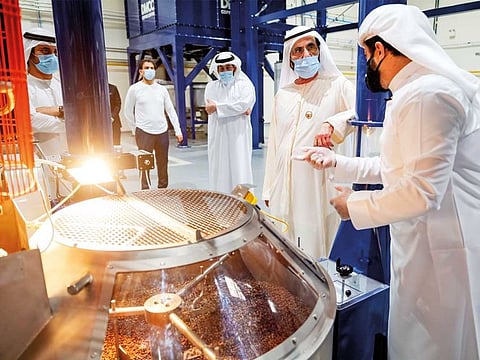How Dubai facilitates international trade in tea and coffee
DMCC aims to triple the output of both tea and coffee centres

In conversation with Sanjeev Dutta, Executive Director of Commodities and Financial Services, Dubai Multi Commodities Centre (DMCC)
How does DMCC boost international trade in tea and coffee through Dubai, while supporting the domestic demand for these beverages?
DMCC was established in 2002 to attract, enable and promote trade through Dubai. Three years later in 2005, the DMCC Tea Centre was opened to boost global tea trade through the emirate and has subsequently facilitated the trade of more than 320 million kilos of tea. The Tea Centre has achieved this by providing a comprehensive ecosystem for the tea industry, with access to a purpose-built facility, world-class services and a growing community of stakeholders. As a result of this, the Tea Centre has positioned the UAE as the world’s largest re-exporter of tea, with a 60 per cent share of the market. Roughly, 10 million tea bags can be produced at the DMCC Tea Centre in a month. Of this number, 7.5 million tea bags are destined for the local Middle Eastern market, whilst the remaining quarter are distributed to the global market.
In 2017 and 2018, the DMCC Tea Centre traded volumes in excess of 50 million kilograms of tea.
Building on the success of the Tea Centre, the DMCC Coffee Centre was launched last year — the first-of-its-kind facility in the Middle East — with the view to transform Dubai into a new global hub for the coffee trade. The DMCC Coffee Centre supports the entire coffee industry from crop to cup, catering to farmers, exporters, traders, roasters and retailers alike. Since its launch, the Coffee Centre handled 1,800 metric tonnes, the equivalent of 25 million cups of coffee.
Roughly, 10 million tea bags can be produced at the DMCC Tea Centre in a month. Of this number, 7.5 million tea bags are destined for the local Middle Eastern market, whilst the remaining quarter are distributed to the global market.

Following visits from His Highness Shaikh Mohammad bin Rashid Al Maktoum, Vice President and Prime Minister of the UAE, and Ruler of Dubai, in June to both the tea and coffee centres, DMCC announced their expansion in line with growing demand and Dubai’s economic diversification strategy. The aim is to triple the output of both centres to drive increased trade through the emirate.
What kind of facilities does DMCC have to facilitate and promote global trade in tea and coffee?
The DMCC Tea Centre provides facilities and services that support the entire tea industry. Spanning almost 24,000 sq/m, the DMCC Tea Centre has the capacity to store up to 5,000 tonnes of tea at a time. Its core services include warehousing, blending and packaging solutions as well as member benefits such as tea tasting.
The DMCC Coffee Centre is a 15,000 sq/m temperature-controlled facility. Its core services include warehousing, roasting and packaging, with a range of specialised services including sample evaluation, quality control, coffee grinding, cleaning, blending, and re-bagging of green coffee, in addition to providing green bean storage at optimal cool temperatures. The Coffee Centre is also home to a Speciality Coffee Association (SCA)-approved training campus for baristas to hone their skills.
What are your top export destinations for tea and coffee?
The Tea Centre presently stocks and facilitates trade with buyers from across Asia, Africa, Middle East, GCC and CIS countries and has plans to expand its services to other Middle East and European markets.
Countries that the Tea Centre currently deals with are Kenya, India, Sri Lanka, Indonesia, Malawi, Rwanda, Tanzania, Zimbabwe, Ethiopia, Vietnam, China, Iran, Iraq, Jordan, Morocco, Pakistan, Afghanistan and the CIS nations.
The Coffee Centre presently stocks and facilitates trade with buyers from across Europe and the USA, Brazil, Colombia, El Salvador, Costa Rica, Ethiopia. Saudi Arabia, Oman, Canada, and Australia, and has plans to expand into emerging markets such as Yemen, Dominican Republic, and Angola.
Sign up for the Daily Briefing
Get the latest news and updates straight to your inbox
